Text
Navigating the SSB Mock Psychology Test: Insights and Strategies
Introduction: The Services Selection Board (SSB) interview is a crucial step for those aspiring to join the armed forces. Within the SSB, the Psychology Test holds significant importance, offering insights into candidates' personalities, aptitudes, and suitability for military life. To excel in this test, candidates need a deep understanding of its structure, along with effective strategies to tackle its various components. Let's delve into the intricacies of the SSB Mock Psychology Test and explore strategies for success.
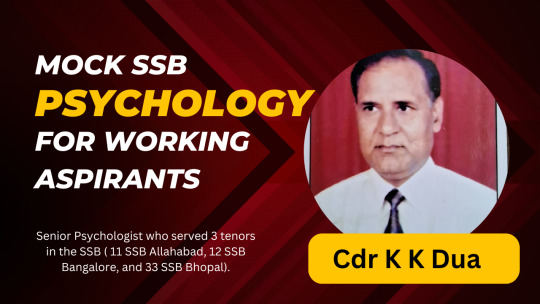
Understanding the SSB Mock Psychology Test: The SSB Psychology Test is designed to assess candidates' psychological attributes, including their cognitive abilities, social skills, emotional intelligence, and leadership potential. It consists of various tasks, each serving a specific purpose in evaluating different facets of a candidate's personality. These tasks typically include:
Thematic Apperception Test (TAT): In TAT, candidates are shown a series of ambiguous images and asked to construct a story around each picture. This test aims to reveal candidates' thought processes, creativity, problem-solving skills, and attitudes towards various situations.
Word Association Test (WAT): WAT involves presenting candidates with a series of words, to which they must respond with the first word or phrase that comes to mind. This rapid-fire exercise provides insights into candidates' subconscious thoughts, attitudes, and personality traits.
Situation Reaction Test (SRT): SRT presents candidates with hypothetical situations or scenarios, followed by multiple-choice questions about how they would respond in each situation. This test evaluates candidates' decision-making abilities, judgment, adaptability, and sense of responsibility.
Self-Description Test (SD): SD requires candidates to provide a written self-description, covering aspects such as personal background, strengths, weaknesses, ambitions, and interests. This test assesses candidates' self-awareness, communication skills, and clarity of thought.
Group Discussion (GD): In GD, candidates engage in structured discussions on various topics with their peers. This task evaluates candidates' communication skills, teamwork, leadership potential, and ability to express opinions coherently while respecting others' viewpoints.
Strategies for Success: To excel in the SSB Mock Psychology Test, candidates should adopt several strategies aimed at maximizing their performance and showcasing their strengths effectively. Here are some tips to consider:
Stay Calm and Confident: Maintain a composed demeanor throughout the test, exhibiting confidence in your abilities. Keep in mind that the assessors are not looking for perfection but rather authenticity and adaptability.
Practice Regularly: Familiarize yourself with the format and requirements of each test component through consistent practice. Work on enhancing your storytelling abilities, vocabulary, and problem-solving skills to excel in tasks like TAT and WAT.
Be Genuine: Avoid presenting contrived responses or trying to mold yourself into an idealized version of a candidate. Instead, focus on being genuine, showcasing your true personality, values, and experiences.
Pay Attention to Instructions: Listen carefully to the instructions provided for each task and adhere to them diligently. Paying attention to detail reflects your ability to follow instructions—a valuable trait in military settings.
Collaborate Effectively: In group tasks like GD, strike a balance between expressing your ideas assertively and actively listening to others. Foster a collaborative atmosphere by encouraging participation from all group members and respecting diverse perspectives.
Reflect on Feedback: After completing mock tests or receiving feedback from mentors or peers, take time to reflect on areas of improvement. Use constructive criticism as an opportunity for growth and refinement.
Conclusion: The SSB Mock Psychology Test serves as a crucial assessment tool for evaluating candidates' suitability for military service based on their psychological attributes and interpersonal skills. By understanding the test's structure and employing effective strategies, candidates can maximize their performance and enhance their chances of success. Remember, the SSB interview is not just about showcasing your skills—it's about demonstrating your potential to contribute meaningfully to the armed forces and embody the core values of honor, courage, and commitment.
0 notes
Text
Mastering Poker Strategy: Understanding Mock GTO Offline
In the intricate world of poker strategy, GTO (Game Theory Optimal) has emerged as a benchmark for optimal play. GTO strategies aim to create balanced ranges that are difficult for opponents to exploit, maximizing expected value over the long run. However, the concept of GTO extends beyond traditional online play; it also applies to live poker, including mock GTO offline scenarios.
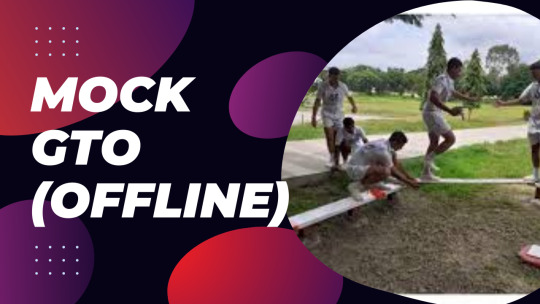
What is Mock GTO Offline?
Mock GTO Offline refers to the application of GTO principles in live, offline poker settings, such as home games, local tournaments, or even casual games among friends. Unlike online poker, where tracking software and extensive data analysis are readily available, offline poker relies more on intuition, observation, and psychological insights.
The Challenges of Applying GTO Offline
While GTO principles remain fundamental, there are unique challenges when implementing them offline:
Limited Information: Unlike online platforms that provide comprehensive data on opponents’ tendencies, offline games offer limited information. Players must rely on physical tells, bet sizing patterns, and past experiences to make informed decisions.
Human Element: Offline poker involves face-to-face interaction, adding a layer of psychological complexity. Players must decipher opponents’ behaviors, emotions, and bluffing frequencies without the aid of digital interfaces.
Adaptation: Live games often feature diverse player pools with varying skill levels and playing styles. Adapting GTO strategies to exploit opponents’ weaknesses while maintaining balance is crucial for success.
Key Principles of Mock GTO Offline
Range Construction: Start by constructing balanced ranges based on position, stack sizes, and game dynamics. Maintain a mix of value hands, bluffs, and marginal holdings to prevent opponents from exploiting predictable patterns.
Observation and Adaptation: Pay close attention to opponents’ tendencies, physical tells, and betting patterns. Adapt your strategy accordingly to exploit weaknesses and adjust to changing dynamics throughout the game.
Exploitative Adjustments: While GTO serves as a baseline, don’t hesitate to deviate from optimal strategies to exploit specific opponents. Identify patterns of behavior and adjust your range to capitalize on their tendencies effectively.
Emotional Control: Stay composed and avoid emotional reactions, even in high-pressure situations. Emotional stability is key to making rational decisions and avoiding costly mistakes.
Table Image Management: Cultivate a balanced table image to keep opponents guessing about your playing style. Vary your aggression levels, mixing in both aggressive and passive lines to maintain unpredictability.
Practicing Mock GTO Offline
Improving your mock GTO skills offline requires practice, observation, and self-reflection:
Home Games and Local Tournaments: Participate in live games regularly to gain experience and refine your skills. Focus on observing opponents’ tendencies and testing different strategies in varying game environments.
Study Sessions: Dedicate time to reviewing hand histories, discussing strategy with peers, and studying poker literature to deepen your understanding of GTO concepts and their applications offline.
Role-playing Exercises: Organize mock GTO exercises with friends or fellow players, simulating real-life poker scenarios to practice decision-making under pressure and refine your ability to read opponents.
Feedback and Analysis: Seek feedback from peers, coaches, or online communities to identify areas for improvement and refine your approach to mock GTO offline play.
Conclusion
Mock GTO Offline represents the fusion of theoretical principles with real-world dynamics, offering a nuanced approach to live poker strategy. By mastering the art of observation, adaptation, and strategic decision-making, players can elevate their game and achieve success in diverse offline poker settings. With dedication, practice, and a deep understanding of GTO concepts, players can navigate the complexities of live poker and emerge victorious at the table.
0 notes
Text
Delving into the World of Mock Psychology: A Humorous Exploration
Introduction: Psychology, the study of the mind and behavior, is a field revered for its depth, complexity, and contributions to understanding human nature. But what about its lesser-known cousin, mock psychology? Unlike its serious counterpart, mock psychology is a lighthearted endeavor, often found in the realms of comedy and satire. It playfully examines the quirks of human behavior, offering amusing insights that may not hold up under rigorous scientific scrutiny but nonetheless provide endless entertainment. So, let's take a whimsical journey into the world of mock psychology, where laughter is the best therapy.
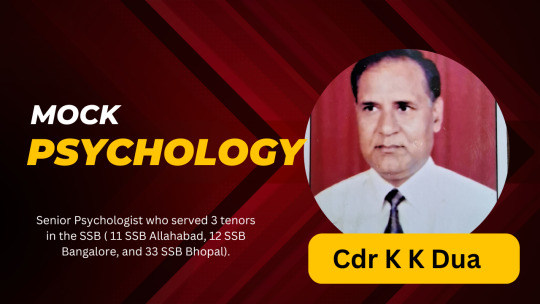
The Pseudoscience of Personality: In mock psychology, personality theories abound, ranging from the absurd to the downright ridiculous. Forget about the Big Five or Myers-Briggs; we're talking about theories like the "Pizza Topping Personality Paradigm" or the "Socks-and-Sandals Syndrome." According to these imaginative frameworks, your choice of pizza toppings or fashion faux pas determines your entire personality. Are you a supreme pizza enthusiast? Congratulations, you're an adventurous risk-taker! Do you commit the fashion sin of wearing socks with sandals? You might be a rebellious trendsetter, or just really, really comfortable.
The Art of Phrenology 2.0: Remember phrenology, the pseudoscience that claimed you could determine a person's personality traits by feeling the bumps on their skull? Well, in the world of mock psychology, phrenology gets a reboot. Instead of feeling for bumps, practitioners might assess personality based on the shape of someone's bedhead or the arrangement of their breakfast cereal. A lopsided bedhead could indicate a chaotic mind, while meticulously arranged cereal might suggest someone with obsessive-compulsive tendencies. Of course, these interpretations are purely for laughs, but they serve as a reminder not to take ourselves too seriously.
The Myth of Mirror Neurons: Mirror neurons, those fascinating cells in the brain that fire both when we perform an action and when we observe someone else performing the same action, have captured the interest of psychologists for years. But in mock psychology, mirror neurons take on a more whimsical role. According to mock psychologists, mirror neurons are responsible for our tendency to yawn when we see someone else yawn, or to cringe when we witness an awkward moment. They even suggest that mirror neurons might be to blame for contagious laughter, which spreads like wildfire in a room full of people watching cat videos.
The Freudian Slip 'n Slide: No exploration of mock psychology would be complete without a nod to Sigmund Freud, the father of psychoanalysis. While Freud's theories have been heavily criticized and debunked over the years, they remain a rich source of comedic fodder. In the world of mock psychology, Freudian slips are not just verbal mistakes; they're windows into the subconscious mind. Accidentally calling your boss "mom" during a meeting? Clearly, you have unresolved issues with authority. Mistakenly referring to your spouse as your ex's name? It's a sign of lingering romantic entanglements. Of course, these interpretations are as silly as they are entertaining, but they remind us that sometimes, laughter is the best therapy.
Conclusion: Mock psychology may not offer the depth or scientific rigor of its serious counterpart, but it serves an important purpose: to remind us that human behavior is complex, messy, and endlessly fascinating. By embracing humor and absurdity, mock psychology invites us to laugh at ourselves and the quirks that make us uniquely human. So the next time you find yourself pondering the mysteries of the mind, don't forget to take a detour into the world of mock psychology. After all, sometimes the best insights come from the most unexpected places.
0 notes
Text
Mastering the 14-Day SSB Coaching Program: Your Path to Success
Introduction: The Services Selection Board (SSB) interview is a crucial step for individuals aspiring to join the Indian Armed Forces. It's a comprehensive evaluation process that assesses not just a candidate's knowledge but also their personality, leadership qualities, and potential to become an officer. To excel in the SSB interview, candidates often seek structured coaching programs. Among these, the 14-day SSB coaching program stands out as a rigorous yet effective method to prepare for this challenging assessment.
Day 1-3: Understanding the SSB Process The initial days of the coaching program focus on familiarizing candidates with the SSB process. From the screening test to the personal interview, every aspect is thoroughly explained. Candidates learn about the various tests they'll undergo, such as the intelligence test, psychological assessment, group tasks, and the final conference. Understanding the SSB process in detail helps candidates approach each stage with clarity and confidence.
Day 4-6: Enhancing Psychological Capabilities Psychological tests are a significant component of the SSB interview. During these days, candidates undergo mock psychological assessments, including the Thematic Apperception Test (TAT), Word Association Test (WAT), and Situation Reaction Test (SRT). They receive personalized feedback on their responses, helping them identify strengths and areas needing improvement. Additionally, coaching sessions focus on developing positive traits like self-confidence, optimism, and emotional resilience, which are crucial for success in the SSB interview.
Day 7-9: Mastering Group Dynamics The SSB interview evaluates not only individual capabilities but also how candidates perform in group settings. Days 7 to 9 are dedicated to mastering group dynamics through various exercises and simulations. Candidates participate in group discussions, group planning exercises (GPE), and outdoor tasks that test their teamwork, communication skills, and decision-making abilities. Coaches provide insights into effective leadership styles, conflict resolution strategies, and how to contribute meaningfully to group activities.
Day 10-12: Personal Interview Preparation The personal interview is a pivotal aspect of the SSB interview, allowing assessors to gauge the candidate's suitability for commissioning as an officer. During these days, candidates undergo mock interviews tailored to the SSB context. Coaches provide constructive feedback on body language, articulation, and content of responses. Additionally, candidates are guided on presenting their life experiences, achievements, and future goals in a manner that aligns with the values and expectations of the armed forces.
Day 13-14: Comprehensive Review and Final Preparations As the coaching program nears its conclusion, candidates engage in comprehensive review sessions to consolidate their learning. They revisit key concepts, practice sample questions, and refine their strategies for each stage of the SSB interview. Emphasis is placed on building mental resilience and maintaining composure during high-pressure situations. Additionally, candidates receive tips on time management and prioritization to optimize their performance during the actual SSB interview.
Conclusion: The 14-day SSB coaching program provides a structured and intensive approach to prepare candidates for the challenges of the SSB interview. Through a combination of theoretical knowledge, practical exercises, and personalized feedback, candidates develop the skills and mindset needed to excel in this competitive assessment. While the coaching program lays the foundation, success ultimately depends on the candidate's dedication, perseverance, and authentic commitment to embodying the values of the armed forces. With the right guidance and preparation, aspiring officers can confidently navigate the SSB interview and embark on a rewarding career serving their nation.
0 notes
Text
The Power of Offline Mock Psychology: Understanding the Human Mind Beyond Screens
In an increasingly digital world where algorithms predict our preferences and social media platforms shape our interactions, the art of understanding human behavior offline seems to be fading into the background. However, the essence of psychology, the study of the mind and behavior, transcends the digital realm. Offline mock psychology, a term coined to describe the observation and analysis of human behavior in real-world settings, offers a profound understanding of individuals beyond the confines of screens. Let’s delve into the significance and practice of offline mock psychology in today’s society.
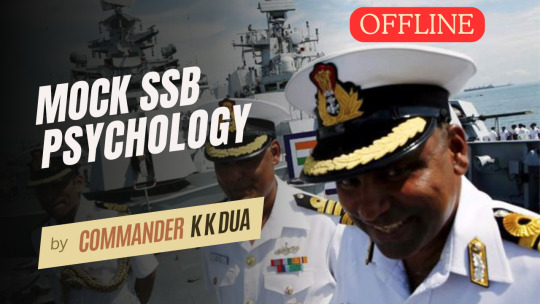
The Human Element in Observation:
Offline mock psychology emphasizes the importance of direct human observation, allowing psychologists, researchers, and enthusiasts to witness behavior in its natural habitat. Unlike online surveys or social media analytics, which often capture curated versions of individuals’ lives, offline mock psychology involves immersion in real-world environments. Whether it’s observing social dynamics in a bustling cafe or studying decision-making processes in a shopping mall, the human element remains central to this practice.
Contextual Understanding:
One of the key advantages of offline mock psychology is its ability to provide a contextual understanding of behavior. Human actions are deeply influenced by environmental factors, social norms, and cultural nuances, which may not always be evident in digital interactions. By immersing themselves in diverse settings, practitioners of offline mock psychology gain valuable insights into how context shapes behavior. From the impact of architecture on mood to the influence of peer pressure on decision-making, every observation contributes to a richer understanding of human psychology.
Uncovering Unconscious Processes:
While online platforms offer vast amounts of data, they often fall short in uncovering unconscious processes that drive human behavior. Offline mock psychology, on the other hand, enables researchers to delve beneath the surface and explore the subconscious mind. Through careful observation and analysis, practitioners can uncover patterns, biases, and cognitive processes that individuals may not even be aware of. This deeper understanding sheds light on the complexities of human psychology and informs interventions aimed at promoting well-being and personal growth.
Bridging Theory and Practice:
In academia, psychology textbooks are filled with theories and concepts derived from controlled experiments and laboratory studies. While these provide valuable insights, they may lack real-world applicability. Offline mock psychology serves as a bridge between theory and practice, allowing researchers to test and refine psychological principles in everyday settings. By observing how theories manifest in real life, psychologists can validate their hypotheses and develop more effective strategies for addressing real-world challenges.
Ethical Considerations:
As with any form of research involving human subjects, offline mock psychology requires careful consideration of ethical principles. Respecting individuals’ privacy, obtaining informed consent, and minimizing harm are paramount in ethical research practices. Practitioners must navigate ethical dilemmas inherent in observational studies, ensuring that their observations are conducted ethically and responsibly.
The Future of Psychological Research:
In an era dominated by digital technologies, offline mock psychology offers a refreshing perspective on the study of human behavior. By grounding psychological research in real-world contexts, practitioners gain a deeper understanding of individuals and societies. As technology continues to reshape our world, the human element remains at the heart of psychological inquiry. Offline mock psychology reminds us of the richness of human experience beyond the screens and invites us to explore the complexities of the human mind in its natural habitat.
In conclusion, offline mock psychology stands as a testament to the enduring relevance of human observation in the field of psychology. By embracing the intricacies of real-world behavior, practitioners gain valuable insights that transcend the limitations of digital data. As we navigate an increasingly complex world, the practice of offline mock psychology serves as a beacon of understanding, reminding us of the profound depths of the human psyche awaiting exploration.
0 notes
Text
Exploring the Art of Mock GTO Offline: Unraveling the Essence of Poker Strategy
Introduction: Poker, a game of skill, strategy, and psychology, has captivated enthusiasts worldwide for centuries. Within its intricate tapestry lies a concept revered among players – Game Theory Optimal (GTO) strategy. GTO serves as a cornerstone for mastering poker, blending mathematical principles with psychological nuances to create a formidable approach. However, understanding GTO and its application necessitates practice, leading players to engage in simulated scenarios known as mock GTO. In this exploration, we delve into the essence of mock GTO offline, unraveling its significance and impact on poker prowess.
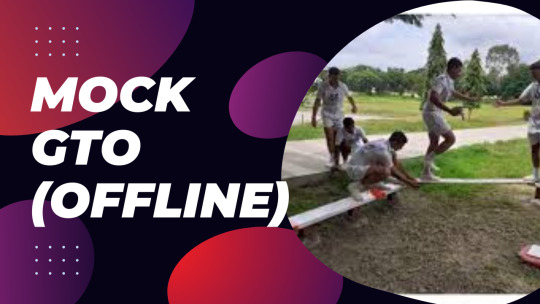
Understanding GTO: At its core, GTO embodies a strategic equilibrium where players' decisions are unexploitable, ensuring a neutral outcome irrespective of opponents' actions. This equilibrium manifests through a balanced range of actions, preventing adversaries from gaining an edge by exploiting predictable patterns. In essence, GTO serves as a shield against exploitation, allowing players to navigate poker's complexities with confidence.
Mock GTO Offline: Mock GTO offline refers to the process of simulating poker scenarios away from the live or online tables. Unlike traditional gameplay, mock GTO enables players to dissect hands, analyze strategies, and refine decision-making in a controlled environment. This method encompasses various exercises, including hand simulations, equity calculations, and range assessments, fostering a deeper understanding of optimal play.
Key Components of Mock GTO:
Hand Analysis: Players scrutinize past hands or hypothetical scenarios, dissecting each decision point to identify optimal strategies. Through thorough examination, participants gain insights into balancing ranges, exploiting opponents' tendencies, and maximizing expected value.
Equity Calculations: Central to mock GTO is the computation of hand equities, determining the probability of winning against opponents' ranges. By honing equity calculation skills, players enhance their ability to make informed decisions based on mathematical probabilities, a hallmark of GTO strategy.
Range Construction: Participants construct and deconstruct ranges, envisioning opponents' likely holdings based on betting patterns, position, and player tendencies. This exercise sharpens intuition, enabling players to anticipate opponents' actions and devise counter-strategies accordingly.
Decision Trees: Utilizing decision trees, players map out potential outcomes for each action, analyzing the ripple effects of their choices. By visualizing decision pathways, participants develop a systematic approach to decision-making, fostering adaptability and foresight.
Benefits of Mock GTO Offline:
Skill Development: Engaging in mock GTO cultivates a deeper understanding of poker theory and strategy, honing critical thinking and analytical skills essential for success at the tables.
Risk-Free Environment: Unlike live or online play, mock GTO offers a risk-free environment for experimentation and exploration, empowering players to push the boundaries of their strategic repertoire without consequence.
Self-Reflection: Through introspection and analysis, players gain insights into their thought processes and decision-making tendencies, facilitating continuous improvement and growth as poker practitioners.
Confidence Building: By mastering mock GTO principles, players enhance their confidence in navigating complex poker scenarios, empowering them to make informed decisions under pressure.
Conclusion: Mock GTO offline stands as a testament to the enduring quest for poker excellence, providing a platform for players to refine their skills and elevate their game to new heights. As the pursuit of mastery unfolds, the essence of mock GTO resonates as a beacon of insight and enlightenment, guiding players on their journey through the labyrinth of poker strategy. In the realm where strategy reigns supreme, mock GTO offline serves as a crucible where champions are forged, their mettle tested and refined in the fires of simulated combat.
0 notes
Text
Mastering the Mock SSB Personal Interview: Your Gateway to Success
The Services Selection Board (SSB) interview is the final frontier for aspirants aiming to join the Indian Armed Forces. This rigorous evaluation assesses not just your knowledge but also your personality, character, and leadership potential. The Mock SSB Personal Interview serves as a vital tool in preparing for this demanding assessment. Let's delve into how you can ace this crucial stage of selection.
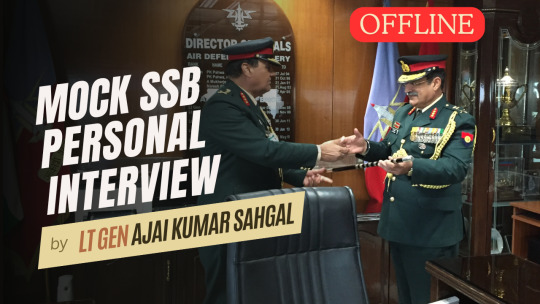
Understanding the Mock SSB Personal Interview
Mock SSB interviews simulate the actual SSB interview process, providing candidates with a realistic preview of what to expect. These mock sessions are typically conducted by experienced professionals or former military personnel who are well-versed in the SSB selection criteria.
Preparation Strategies
1. Research:
Knowledge about the armed forces, current affairs, national and international events, and socio-economic issues is essential. Stay updated with recent developments and understand the core values and ethos of the armed forces.
2. Self-awareness:
Reflect on your strengths, weaknesses, achievements, and failures. Understand your personality traits, interests, and aspirations. This introspection will help you present yourself authentically during the interview.
3. Communication Skills:
Practice effective communication, both verbal and non-verbal. Work on articulating your thoughts clearly, maintaining eye contact, and using appropriate body language. Practice speaking confidently and coherently on a wide range of topics.
4. Leadership and Teamwork:
Demonstrate your leadership potential by sharing experiences where you led a team, resolved conflicts, or achieved common goals. Emphasize your ability to work collaboratively and adapt to different roles within a team.
5. Decision Making and Problem Solving:
Be prepared to discuss situations where you had to make tough decisions under pressure. Showcase your analytical skills, rational thinking, and ability to devise effective solutions to complex problems.
Mock Interview Simulation
During the mock SSB interview, expect questions on various aspects of your life, ranging from personal experiences to socio-political issues. Be ready to discuss your educational background, family, hobbies, interests, and career aspirations. Here’s a glimpse of what you might encounter:
Personal Information:
Introduce yourself.
Discuss your family background, education, and achievements.
Talk about your hobbies, interests, and extracurricular activities.
Current Affairs:
Share your views on recent national and international events.
Discuss socio-economic issues and their implications.
Express opinions on topics like politics, environment, technology, etc.
Situation Reaction Test (SRT):
Respond to hypothetical situations testing your decision-making abilities.
Provide logical and practical solutions to challenging scenarios.
Personal Interview:
Answer questions related to your motivations for joining the armed forces.
Explain your career goals and aspirations within the military.
Discuss your strengths, weaknesses, and areas of improvement.
Key Takeaways
Approach the mock SSB interview with a positive attitude and enthusiasm.
Listen carefully to the questions and respond thoughtfully.
Be honest, authentic, and assertive in your responses.
Learn from feedback and areas of improvement identified during the mock session.
Practice regularly and refine your communication and problem-solving skills.
The mock SSB personal interview is not just a simulation; it’s a stepping stone towards success in the actual SSB interview. Utilize this opportunity to fine-tune your abilities, build confidence, and enhance your overall candidacy. With thorough preparation and a focused mindset, you can conquer the challenges of the SSB interview and embark on a rewarding journey in the Indian Armed Forces.
0 notes
Text
Mock SSB Interview
The only difference between a Mock SSB Interview and a Real SSB/AFSB/NSB Interview is that in a mock SSB Interview, you get feedback from all three officers (IO, GTO, and Psychologist).
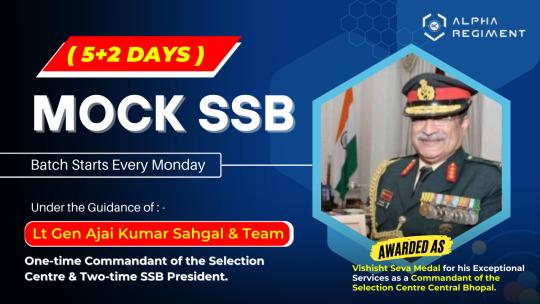
0 notes
Text
Defence Exams Coaching - Alpharegiments
Defence Exams Coaching - Preparing for defense exams, whether for entry into the military, paramilitary forces, or other defense-related positions, can be rigorous and demanding.lpharegiments
0 notes
Text
SSC Coaching - Alpharegiments
SSC Coaching - Alpharegiments preparing for SSC exams, which are competitive government job exams in India, you may want to consider joining a coaching institute or using online resources to help you with your preparation.
1 note
·
View note